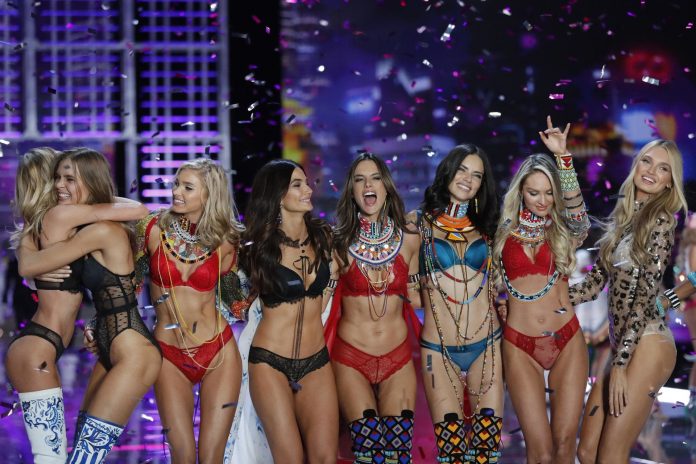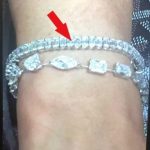For better or worse, the Victoria’s Secret Angels won’t be strutting down the runway in pink lingerie this year. Throughout the 2000s, Thais tuned in to the annual Victoria’s Secret Fashion Show – many casually viewing the spectacle, others dissatisfied with their own bodies.
“The show definitely triggered my eating disorder. It was one of the main triggers actually,” said Worada Elstow, a model.
Worada, 27, previously opened up to Khaosod English about how suffering from both anorexia and bulimia wracked her university years. On a good day, she would have a meal of vegetables while on others, just black coffee and a cigarette. She would scour pro-ana, or pro-anorexia, content online for inspiration – including Victoria’s Secret models on the runway.
Worada isn’t alone. While the Victoria’s Secret Fashion Show has been roundly criticized and debated in Western media for its promotion of unattainable beauty ideals, Khaosod English spoke to a number of Thai models who argue the spectacle’s effects reach internationally.
In the US, Victoria’s Secret will shut down 53 stores this year alone. But overseas stores have been expanding, jumping from about 1,000 total stores in 2010 to 1,637 in 2019. Thailand has two lingerie stores, one in CentralWorld and another in Iconsiam, and 17 branches selling Victoria’s Secret beauty products.
Meanwhile eating disorders, especially among urban Thai women, are on the rise, although underreported and unstudied. Although Worada says she looked forward to watching the show each year to see what the designers came up with, she says that “it’s also nice to not have to be reminded of how unattractive the rest of us are compared to the models.”
Victoria’s Secret has seemingly been undergoing a period of tumultuous change since Shanina Shaik, one of the fashion show’s regular models, announced that the annual show was cancelled on July 31. On Tuesday, Ed Razek, the CEO of the company’s parent, L Brands, resigned. A year before, he had made comments about the show excluding plus-sized and trans models that ignited backlash. On Monday, Brazilian Valentina Sapaioannounced she was the company’s first transgender model.
“[The cancellation] has always been looming in the distance because Victoria’s Secret always emphasised the promotion of unrealistic beauty,” Worada said. “They don’t seem to be evolving while the fashion world has been turning more and more towards realistic beauty.”
The fashion show’s ratings have been dropping across the board in recent years, plunging to a low in 2018 – around 3.27 million viewers in the US, compared to 12.4 million in 2001 during its heyday.
‘Love yourself, don’t fool yourself’
Naticha “Ginger” Watanyutapong, 24, is a rare breed in Thailand – a plus-sized beauty blogger at Gingerie, which has more than 33,000 followers. She gained a viral following after she appeared in a video interview with The Matter, where she spoke about being confident in her naturally large-boned, curvy body. Commenters appreciated her imploration for Thai society to accept different types of beauty, not just the ideal of petite and white-skinned women.
Ginger too was once a long-term viewer of the Victoria’s Secret Fashion Show, checking in each year “like tradition.”
“The models are pretty, but remember that you are too. It’s fun to watch the show and listen to the songs, but you don’t have to say, ‘Oh my gosh, I’m an orangutan compared to them,’” Ginger said. “You don’t have to feel like a failure while watching.’”
Still, the model acknowledges that the show creates pressure for models and triggers those at risk of eating disorders.
“Looking at past shows, all the models seem cut from the same block, no matter their skin color. And they all have to train very hard to get those bodies, and some even develop eating disorders,” Ginger said. “So it would be good to see the company develop in a better way.”
In 2018, Victoria’s Secret model Bridget Malcolm came forward with a two-year eating disorder.
But Ginger doesn’t advocate demonizing conventionally pretty bodies, and nor does she embody the Western fat acceptance movement. Although she would like to see a plus-sized Angel, she believes they should still embody a healthy image.
“It would be nice to see them appreciate different bodies, like slightly larger bodies but which are still fit, healthy, and where you can see the self-care,” Ginger said.
“Some people think that accepting plus-sizes means accepting obesity,” Ginger continued. “I disagree. I want to push people to love themselves, eat well, get moving, and stop smoking. Don’t be careless while proclaiming that you love yourself. Health is important.”
The blogger warns that deliberately staying at an unhealthy obesity level can create problems for one’s future health, as well as burdens for loved ones and even children who may inherit obesity-linked diseases.
“Love yourself, but don’t fool yourself,” she said.





